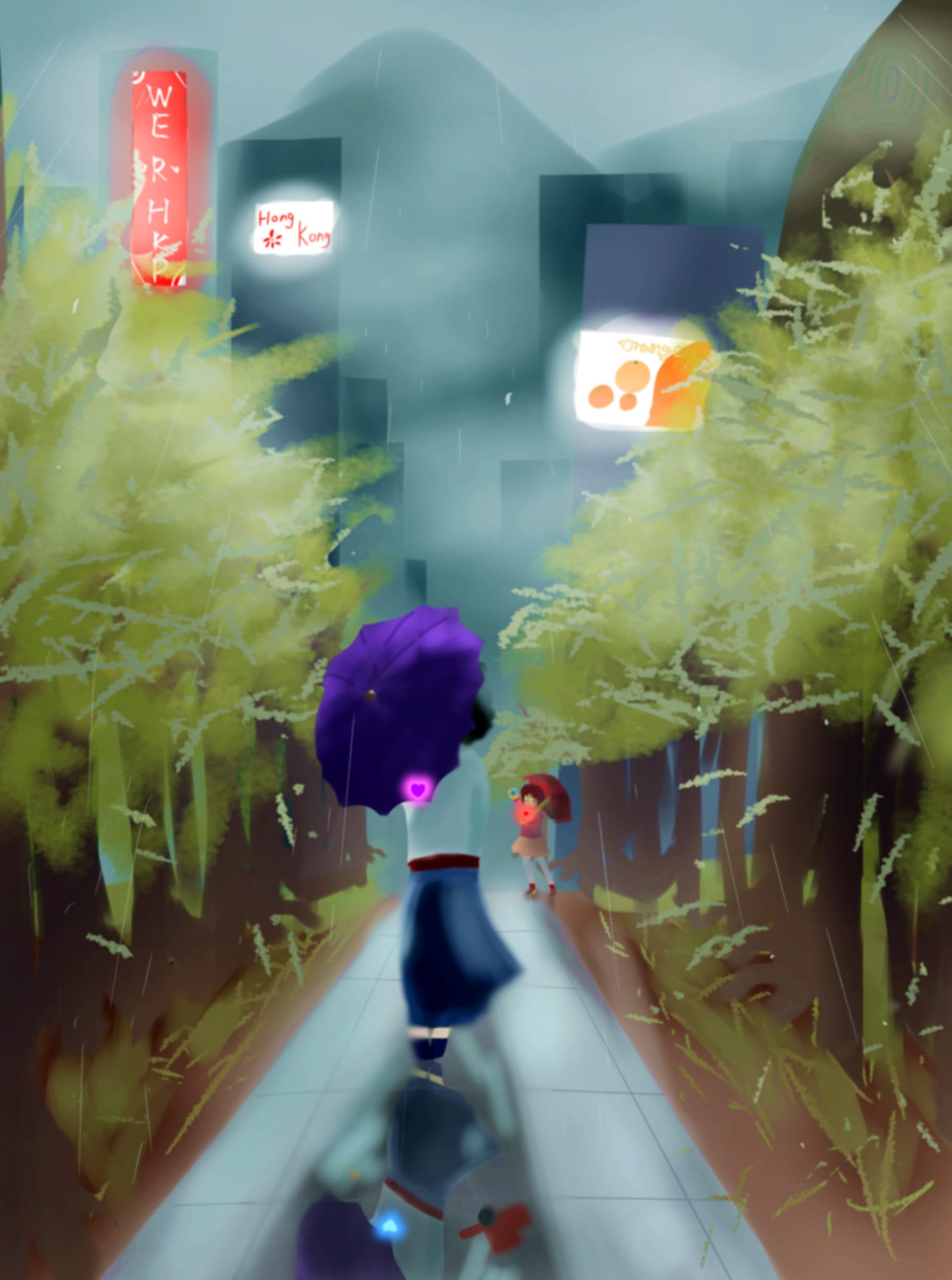
A visual representation of "Rain Scene" by Collier Nogues
KE Yi Xin
Shek Lei Catholic Secondary School
The painting depicts a mother and her child walking in the rain.
The mother looks at her child and thinks of her childhood, her family and her hometown.
Thinking about the differences between the place she is living in now and her hometown, she finally resolves her feelings of doubts.
In the painting, I chose the colours of red and blue to present the poem.
Red represents the territory under the mother’s feet, which shows the place she is living in, and blue is the colour of her hometown. In this way, the mother’s identity and cultural identity are expressed, and the ultimate artistic conception is brought out.
The foggy weather with rain is used to express the mother’s confusion.
In the fog, the skyscrapers are hidden, just like the mother who is confused about her roots.
Simultaneously, the mother silently looks at her daughter to express her gentleness.
She just looks at her daughter advancing to the city.
She does not stop her, but quietly supports her from behind.
This is a common act of kindness of mothers and it is a good way to show the parental love and support for children.
Rain Scene
for Opal, and for Hong Kong, the city she’ll grow up in
Sheltered by the white-tiled park overhang,
I watch you run in nonstop loops. You’ve found
a shallow soup-bowl where a tree was planted once
but didn’t take. Its surviving neighbor trees, each
in their own soup, quiver in the light rain
while you stomp, soaking the socks I’ll soak again
tonight to leach from them their rust-red mud.
Of course I remember the pleasure this is.
This isn’t the color my mud was. Mine
was white, limestone ground down to river clay
and rife with flint and fossils. At every flood
we found dead things risen with the water.
In case the road washed out we had the truck,
and when the creek rose past truck-axle-height,
my father drove the tractor to the highway
and hitched a ride to get more milk.
More milk here takes merely a walk
down to the Circle K, whose clerk knows you
and says hello. Hello you say to her, or if she says
jóu sàhn, you say jóu sàhn. Jóu sàhn, says the fruit stand man
who offers you an orange. You take words in
and give them back, but sometimes changed: orange
becomes ocean–because of cháang, I think–
which in our family now describes both fruit and sea.
The sea comes very near the fruit stand, surging in
on Lam Tsuen River’s tide from Plover Cove,
but the watercourse is paved and engineered, no chance
of flood no matter how the rain comes down. My mother
would have liked that, would have liked the refuge
this city makes, the care its people take to greet
each other. Thank you for the ocean, you say to the man.
What she would have made of you, I wonder.
I wonder where her heaven is. Far from my father’s,
surely. Or near, in that for both of them, just as for me,
you are every heaven’s anchor. I am glad we’ve anchored here,
where I watch you watching for snails, the giant ones
who come out in the rain, bigger than the ocean you’ve forgotten
in your awe, are those its hands you ask and no, I say,
they are a kind of eyes, a kind which can bear water.
Some creatures, even cities, make their own shelter.
Collier Nogues
The poem was first published on the Writing Plus website as part of the Urban Love Poetry Contest for the 2020 Hong Kong International Literary Festival Schools Programme: https://www.writingplus.hk/urban-love-poem-2020, reprinted with the permission of the poet.